In today’s competitive market, sales teams need to quickly find new business opportunities to stay ahead. Yet, sourcing prospects organically often burns time your reps simply don’t have. That’s why many sales and marketing leaders now buy business leads, which are verified contacts that match their target audience, comply with privacy regulations, and integrate directly into their CRM.
Whether you need fresh data for cold-email sprints, direct-dial phone blitzes, LinkedIn outreach, or simple database enrichment, purchasing high-quality leads lets you skip the manual research and focus on meaningful conversations.
In this comprehensive guide, we’ll compare over 20 of the best places to buy B2B leads in 2025. These platforms and vendors provide databases of business contacts, often including emails, phone numbers, and firmographic details. Generally, you can filter these contacts by criteria like industry, job title, company size, location, and more. We’ll cover each provider’s features, pros and cons, pricing, and ratings, as well as general tips on choosing a reputable lead source and maximizing ROI from purchased leads. Let’s dive into the 20+ best business-lead vendors for 2025, starting with Salesgenie®.
Best 20+ Business Leads Providers in 2025
1. Salesgenie
Salesgenie is a powerful lead generation platform that provides unlimited access to millions of verified contacts. Designed to supercharge your sales and marketing efforts, it empowers businesses to identify, connect with, and convert their ideal customers through highly targeted, data-driven campaigns.
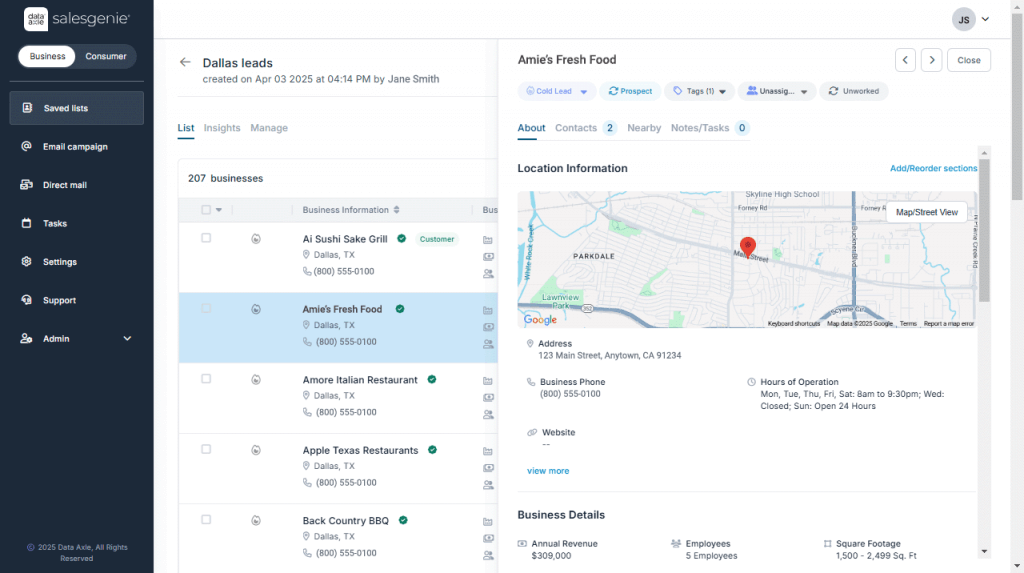
Key Features
- Over 25 million business and 245 million consumer contacts (U.S.)
- Advanced search filters (industry, location, SIC/NAICS codes)
- Built-in email, phone, and direct mail outreach tools
- Lead management system (assignments, notes, tagging)
- Data accuracy guarantee (credit refunds for outdated contacts)
Pricing
- Basic plan: $99/month
- Pro plan: $149/month
- Team plan: $299/month
Ratings
- G2: 4.4/5
- Capterra: 4/5
Pros
- Combines B2B and B2C leads
- Salesgenie excels at delivering small business leads for local‑market sellers and franchise owners.
- Intuitive for SMB teams
- Strong customer support and onboarding
Cons
- Limited international data
- Slightly more limited B2B database compared to competitors
Your next customer is waiting. Don’t miss out!

2. Data Axle USA
Data Axle USA is a trusted source in precision-targeted, fully verified B2B and B2C mailing lists, empowering businesses to reach the right audience at the right time. With access to one of the industry’s most comprehensive and continuously updated databases, marketers can confidently execute high-impact direct mail, email marketing, and telemarketing campaigns that drive response, improve ROI, and support long-term customer acquisition goals.
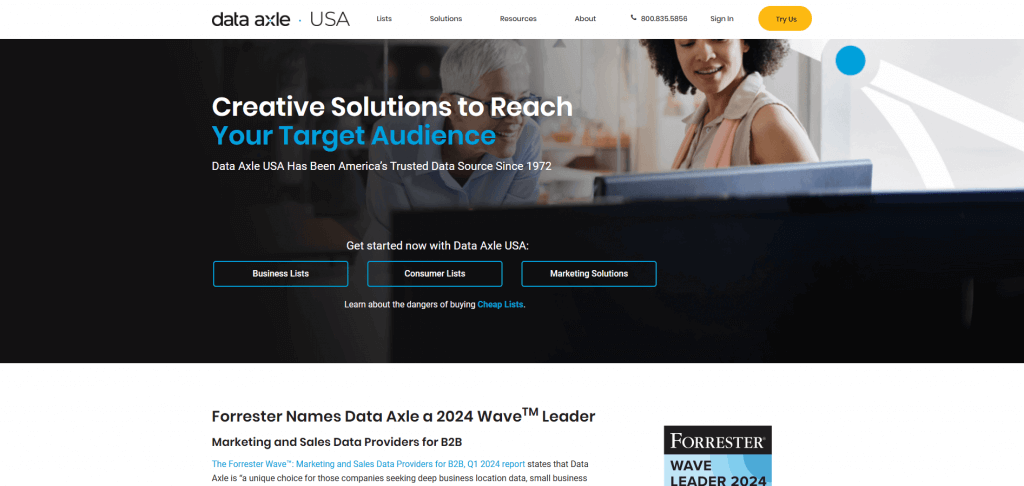
Key Features
- Extensive U.S. business and consumer data with hundreds of targeting selects (e.g., firmographics, demographics, lifestyle attributes)
- Customizable lists (industry, size, location, demographics)
- Integrated direct mail and email marketing services
- CCPA-compliant data and CRM data enrichment services
- Guaranteed deliverability on selected lists
Pricing
- Contact Data Axle USA for pricing details
Ratings
- G2: 4.4/5
- Capterra:4/5
Pros
- Extensive, accurate SMB and consumer data
- Comprehensive targeting criteria
- Integrated marketing execution
- Exceptional customer support
Cons
- Primarily North American data (limited international coverage)
- Must contact Data Axle USA for pricing
3. Apollo
Apollo.io is a versatile B2B sales intelligence platform that combines lead generation and sales engagement tools, streamlining the sales process from prospecting to outreach.
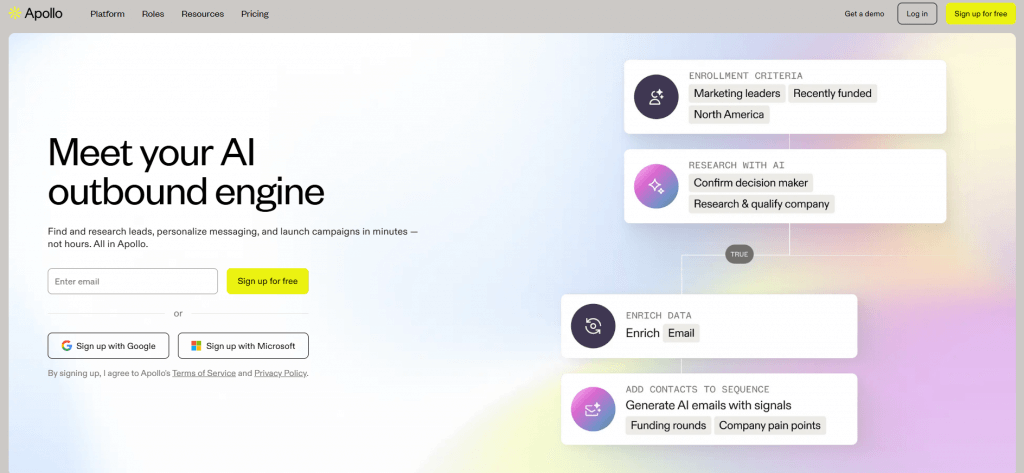
Key Features
- 210M+ contacts and 35M companies
- Email sequences and calling features
- Chrome extension and CRM integrations
Pricing
- Free plan available
- Paid plans start at $49/user/month (annual) — $59 if paid monthly.
Ratings
- G2: 4.7/5
- Capterra: 4.7/5
Pros
- All-in-one prospecting and outreach
- Strong value for money
- Easy-to-use interface and excellent integrations
Cons
- Lower-tier plans cap daily exports & email sends
- Data accuracy can vary
- Advanced analytics reserved for higher-priced plans
4. UpLead
UpLead provides real-time verified B2B leads, ensuring high-quality, accurate emails.
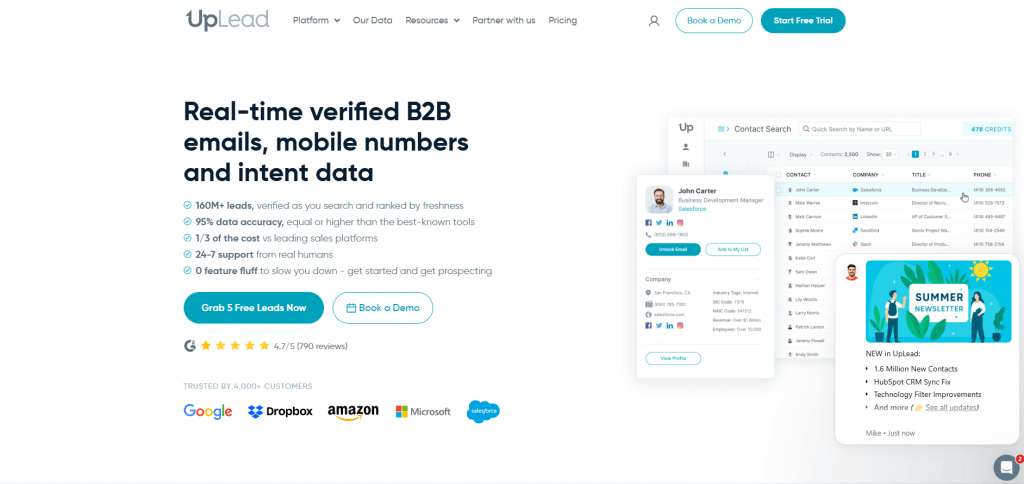
Key Features
- Real-time email verification
- Technographic and intent data
- Advanced filtering
Pricing
- Essential: $99/mo. (170 credits), Plus: $199/mo. Professional: $399/mo.
- Prices shown are for annual plans; month-to-month runs higher
Ratings
- G2: 4.7/5
- Capterra: 4.6/5
Pros
- High-quality, real-time verified data
- Excellent customer support
- Transparent, user-friendly interface
Cons
- Smaller database compared to industry giants
- Lowest pricing requires annual billing; monthly plans cost more
- Limited free trial
5. EasyLeadz
EasyLeadz specializes in direct business phone numbers, particularly for Indian and SME markets.
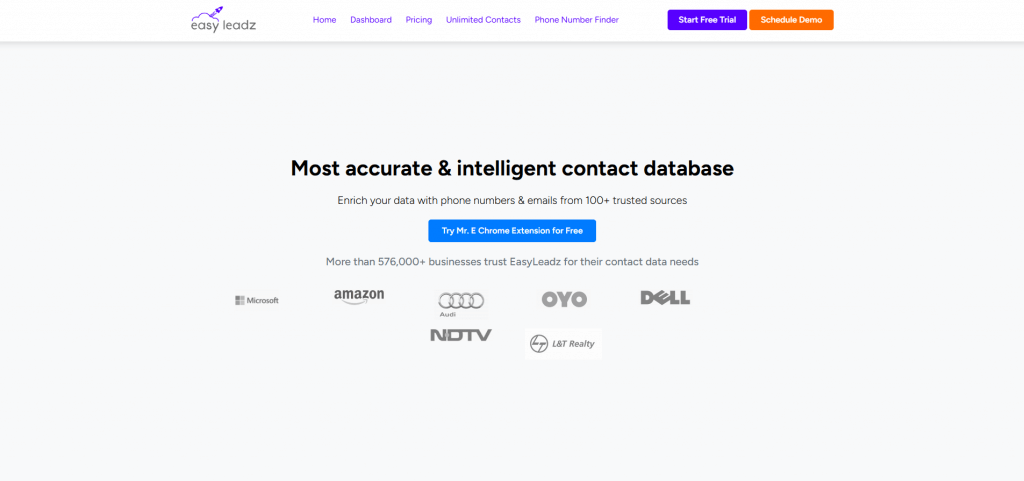
Key Features
- “Mr. E” Chrome extension for direct dials
- SME-focused prospecting
- GDPR-compliant contacts
Pricing
- Plans from $29/month
Ratings
- G2: 4.6/5
- Capterra: N/A
Pros
- Excellent mobile/direct phone coverage
- Strong in emerging markets (India)
- Easy-to-use, affordable plans
Cons
- Limited global reach
- Light on advanced integrations
- Primarily LinkedIn-focused
6. Cognism
Cognism is a global sales intelligence tool noted for its compliant, highly accurate international B2B data—particularly verified mobile numbers.
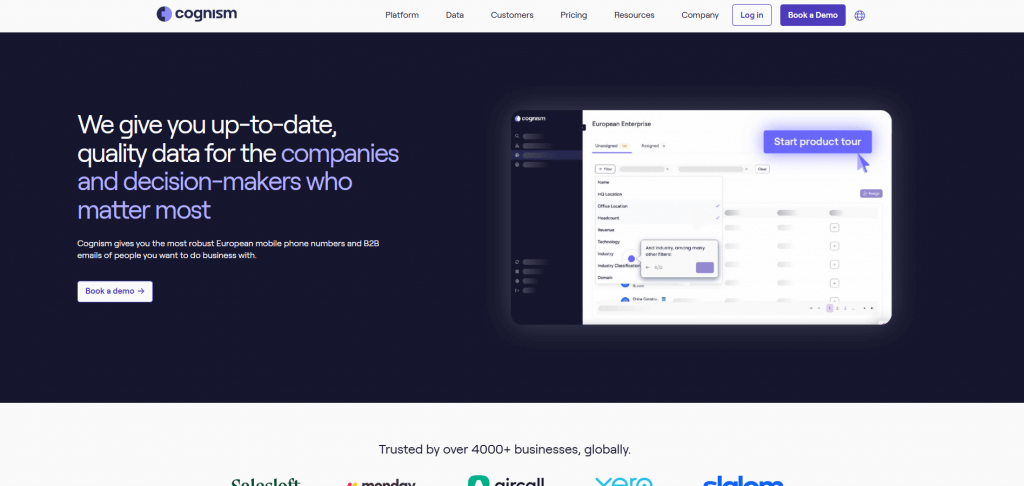
Key Features
- Global B2B contacts with verified phone data
- Strong GDPR/CCPA compliance
- Intent data powered by Bombora
- AI-driven lead search and enrichment
Pricing
- Custom-tailored plans; typically mid-market to enterprise
- Pricing available upon request; unlimited data use within plans
Ratings
- G2: 4.6/5
- Capterra: 4.7/5
Pros
- Superior international (EMEA/APAC) contact data
- High-quality, verified mobile numbers
- User-friendly with excellent customer support
Cons
- Pricing not publicly available; requires sales interaction
- Less established brand awareness in North America
7. ZoomInfo
ZoomInfo is an industry-leading B2B intelligence platform with over 300 million contacts globally, known for detailed lead data, intent tracking, and sales automation tools.
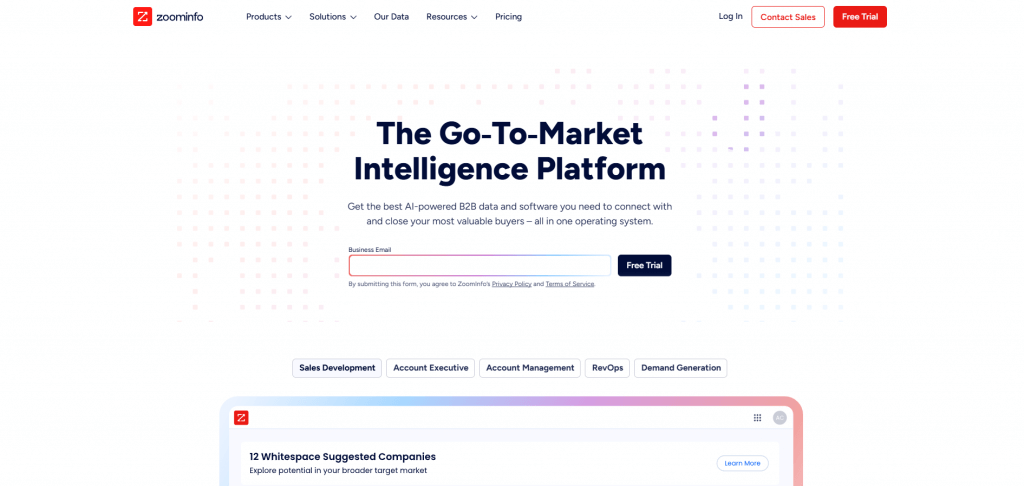
Key Features
- Global B2B database
- Buyer intent signals and technographics
- CRM integrations and automated outreach
- Real-time data updates
- AI assistant
Pricing
- Representative customer quotes suggest packages often start around $15 k/yr; actual price is quote-based.
- Offers a 14-day free trial
Ratings
- G2: 4.5/5
- Capterra: 4.1/5
Pros
- Extensive and accurate U.S.-focused data
- Comprehensive sales and marketing features
- Strong integrations and automation capabilities
Cons
- High cost; mainly for mid-size to large enterprises
- Pricing lacks transparency (requires sales call)
- Occasional data inaccuracies due to database size
8. Lead411
Lead411 offers verified B2B contact data (over 450 million contacts), specializing in direct phone numbers and intent signals.
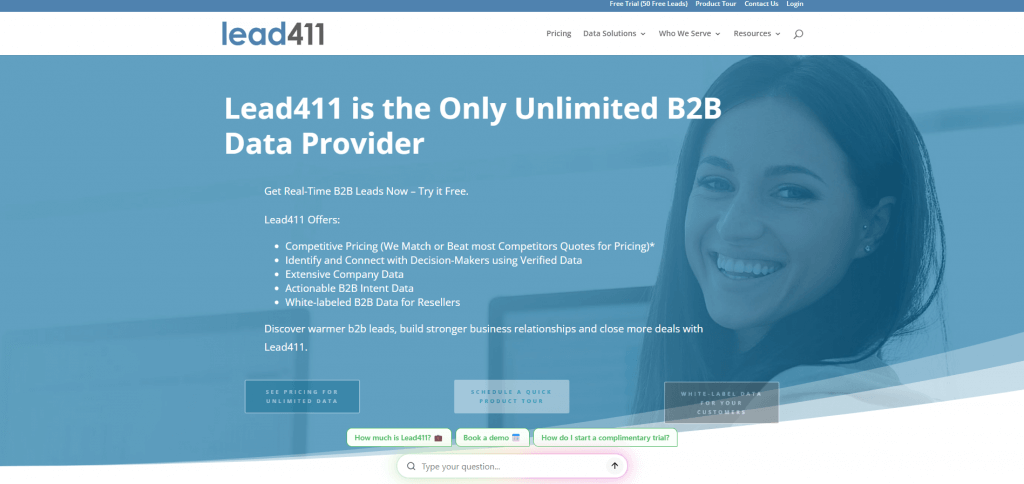
Key Features
- Human-verified contact info
- Intent data and trigger events
- Unlimited export plans
Pricing
- Basic: $99/mo.
- Pro and Enterprise: custom pricing
Ratings
- G2: 4.5/5
- Capterra: 4.7/5
Pros
- Accurate direct phone numbers
- Intent data integration
- Unlimited exports (selected plans)
Cons
- Primarily North American focus
- Advanced features require higher plans
- Interface slightly dated
9. Crunchbase
Crunchbase is a top resource for discovering tech startups, company funding, and key contacts.
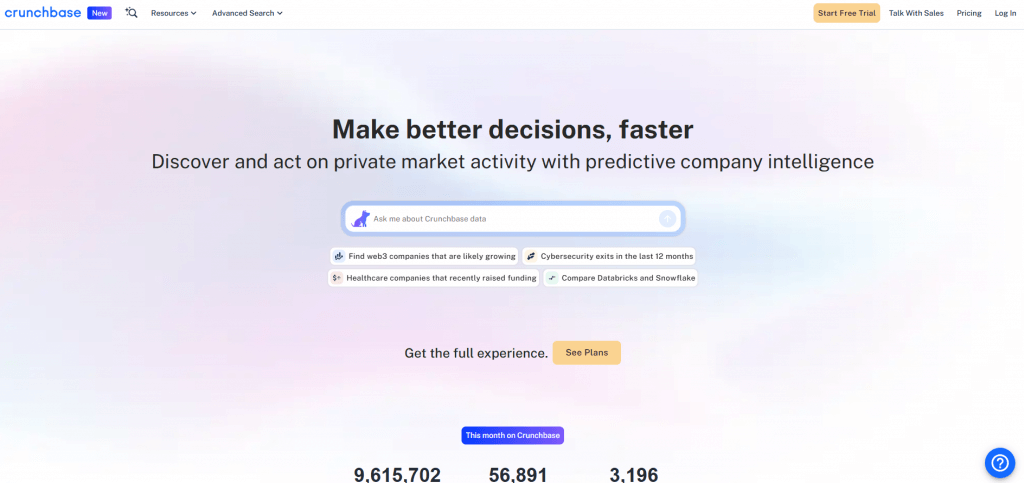
Key Features
- Detailed startup and investor data
- Advanced search filters and alerts
- CRM integrations
Pricing
- Free basic tier
- Crunchbase Pro from $49/user/month (annual billing)
Ratings
- G2: 4.5/5
- Capterra: 4.2/5
Pros
- Best for identifying newly funded startups
- Rich, unique company insights
- Excellent for ABM strategies
Cons
- Limited direct contact info
- Pricing not ideal for bulk leads
10. Seamless.AI
Seamless.AI leverages AI to quickly find emails and direct dials for sales outreach.
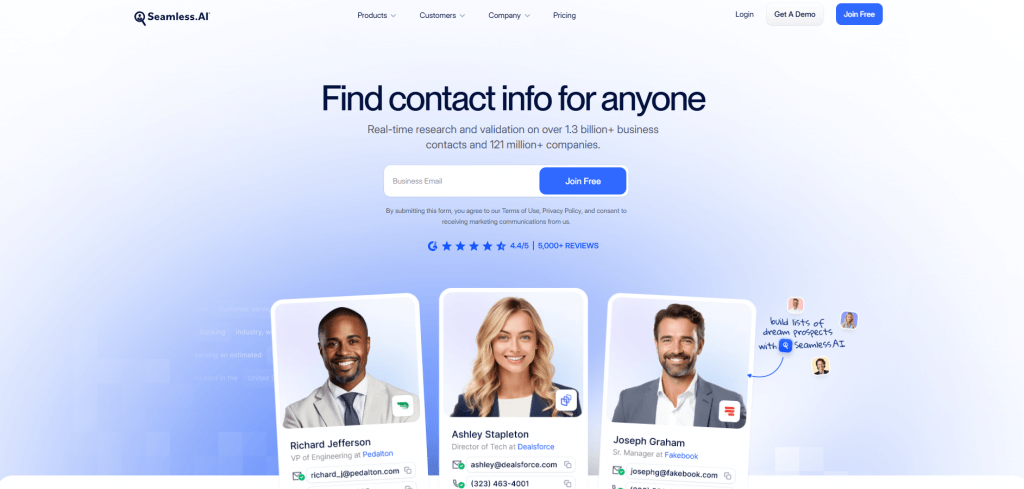
Key Features
- 1.7 billion contacts
- Intent scoring and job-change alerts
- CRM integrations and Chrome extension
Pricing
- Pricing via sales quote
Ratings
- G2: 4.4/5
- Capterra: 4.1/5
Pros
- Large database
- Useful AI-driven updates and alerts
- Free trial
Cons
- Data accuracy varies
- Non-transparent pricing
- Interface less polished
11. RocketReach
RocketReach offers quick access to emails, phones, and social links for over 700 million professionals globally.
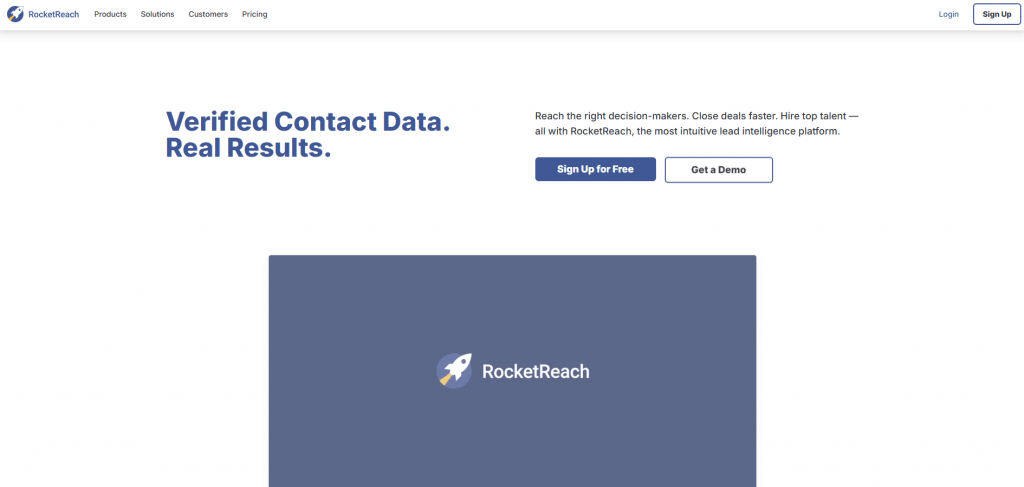
Key Features
- Extensive contact database
- Dynamic contact list building
- Chrome extension for easy contact retrieval
Pricing
- From $48/month (Essentials)
- Pay-as-you-go credits available
Ratings
- G2: 4.4/5
- Capterra: 4.1/5
Pros
- Huge database coverage
- Flexible pricing (including pay-as-you-go)
- Accurate personal work emails
Cons
- Minimal company data depth
- Basic interface
- Limited advanced filtering
12. Kaspr
Kaspr is a GDPR-compliant prospecting tool focused on European B2B contacts, known for quickly finding accurate emails and phone numbers via LinkedIn.
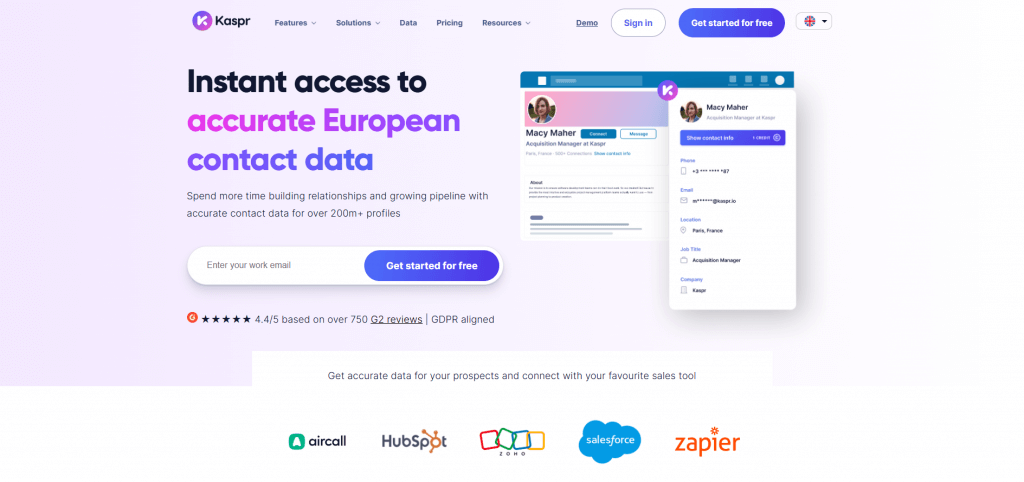
Key Features
- 120 million European contacts
- Chrome extension for LinkedIn data extraction
- Credit-based pricing
Pricing
- Free plan with limited credits
- Paid plans start at $49 a month
Ratings
- G2: 4.4/5
- Capterra: 3.3/5
Pros
- High-quality data
- Simple and user-friendly
- Flexible, budget-friendly pricing
Cons
- Limited global coverage (primarily EU-focused)
- Limited bulk-export capacity (credit caps)
- Best suited for smaller teams or targeted outreach
13. Lusha
Lusha is a straightforward B2B prospecting tool, ideal for sales reps and marketers looking for accurate contact details quickly.
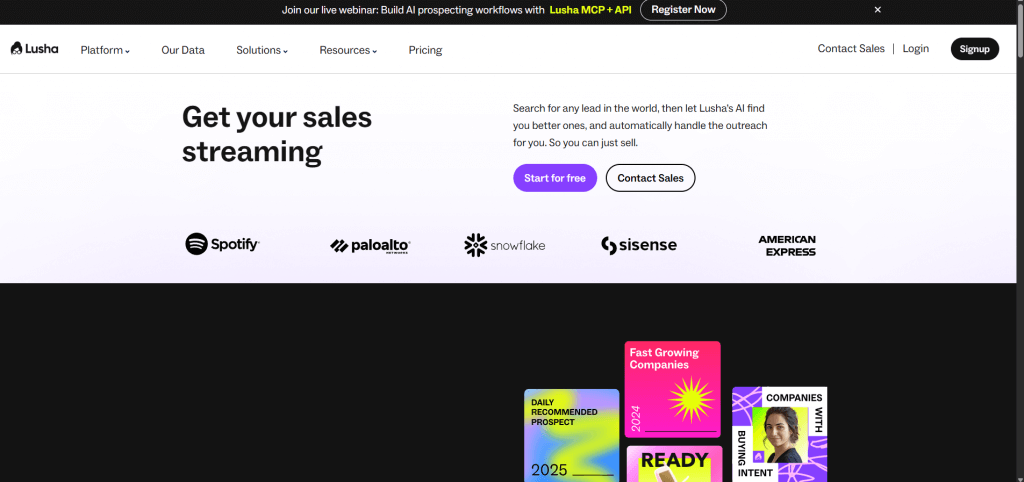
Key Features
- 150M+ business profiles
- Chrome extension for LinkedIn data extraction
- Verified emails and direct dials
- CRM integrations
Pricing
- Free plan (5 credits/month)
- Paid plans from $36/month (Pro)
- Credit-based system (pay-per-contact)
Ratings
- G2: 4.3/5
- Capterra: 4.1/5
Pros
- User-friendly, quick onboarding
- Flexible, affordable pricing
- High accuracy for essential contact data
Cons
- Limited data coverage compared to larger platforms
- Fewer advanced features (e.g., technographics, firmographics)
14. SalesIntel
SalesIntel provides highly accurate B2B contacts through automated tools and human-verified “Research-on-Demand.”
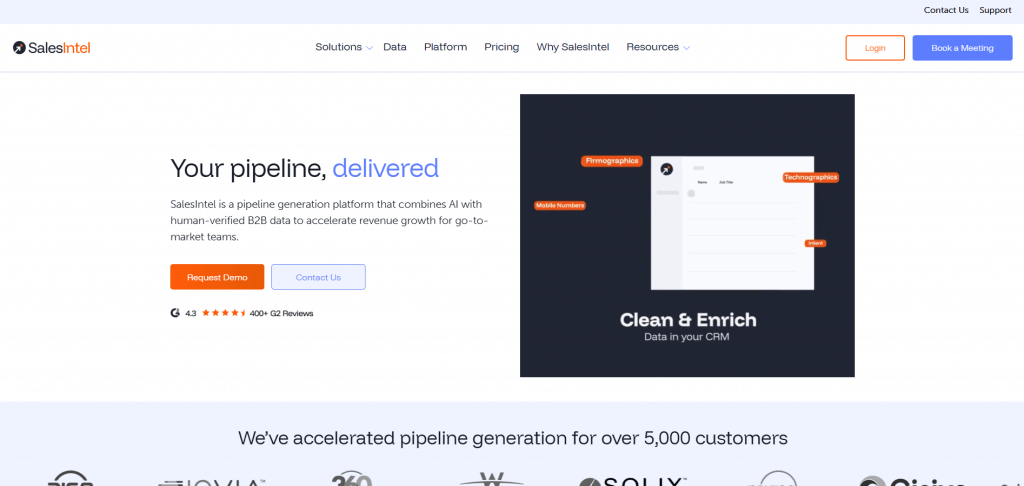
Key Features
- 100 million contacts with direct dials and emails
- Human-verified research service
- Chrome extension and CRM sync
Pricing
- Historically listed at $69/user/mo.
Ratings
- G2: 4.3/5
- Capterra: 4.3/5
Pros
- High accuracy
- Rapid on-demand contact research
- Strong intent signals
Cons
- Interface functional but basic
- Pricing less transparent, aimed at teams
- Database smaller than largest providers
15. LeadMine
LeadMine is a streamlined B2B tool for finding and verifying emails quickly, ideal for small teams and startups.
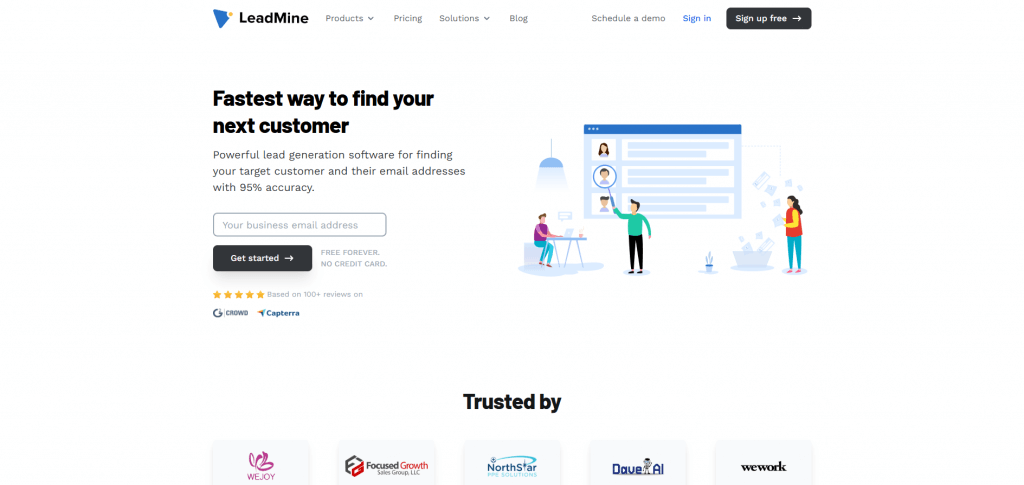
Key Features
- Database of 200 million business contacts
- Email finder and verifier
- Simple search and expor
Pricing
- Free (10 credits/month), paid plans from $29/month
Ratings
- G2: 4.3/5
- Capterra: 4.6/5
Pros
- Simple, user-friendly interface
- Budget-friendly pricing
- Accurate email verification
Cons
- Limited data depth (no intent data, basic phone coverage)
- No advanced CRM integrations
16. LeadIQ
LeadIQ streamlines B2B prospecting from LinkedIn directly into your CRM, reducing manual effort significantly.
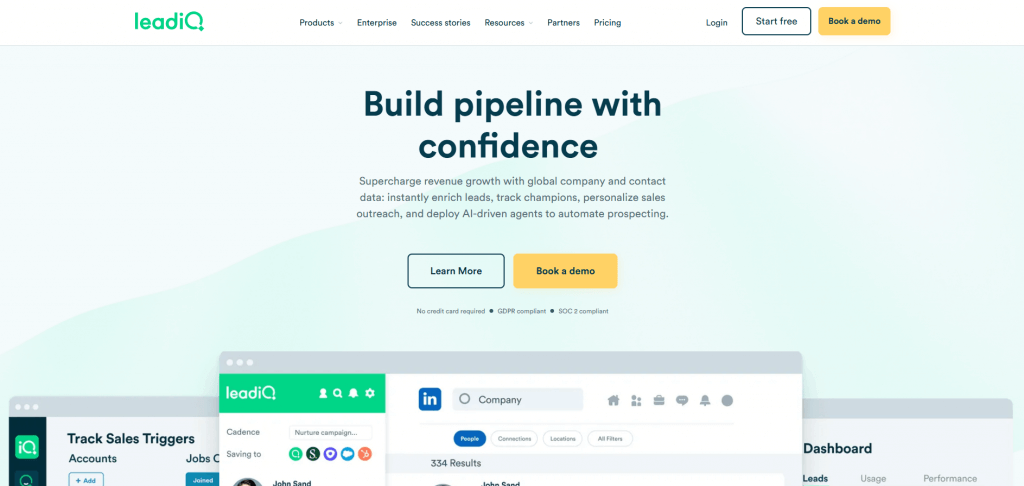
Key Features
- 145 million verified emails
- Chrome extension for LinkedIn/Sales Navigator
- Instant CRM synchronization
- Job-change and intent signals
- AI-generated ice-breaker suggestions (on select plans)
Pricing
- Free tier (50 emails/month)
- Paid from $39/user/month
Ratings
- G2: 4.2/5
- Capterra: 4.4/5
Pros
- Major time-saver for SDRs
- Easy integration with CRMs
- Generous free tier
Cons
- Dependent on LinkedIn data quality
- Not ideal for bulk lead gathering
- Occasional outdated contacts
17. D&B Hoovers
D&B Hoovers (by Dun & Bradstreet) provides extensive global company and contact data along with detailed business insights and risk analytics, suitable for mid-market and enterprise sales teams.
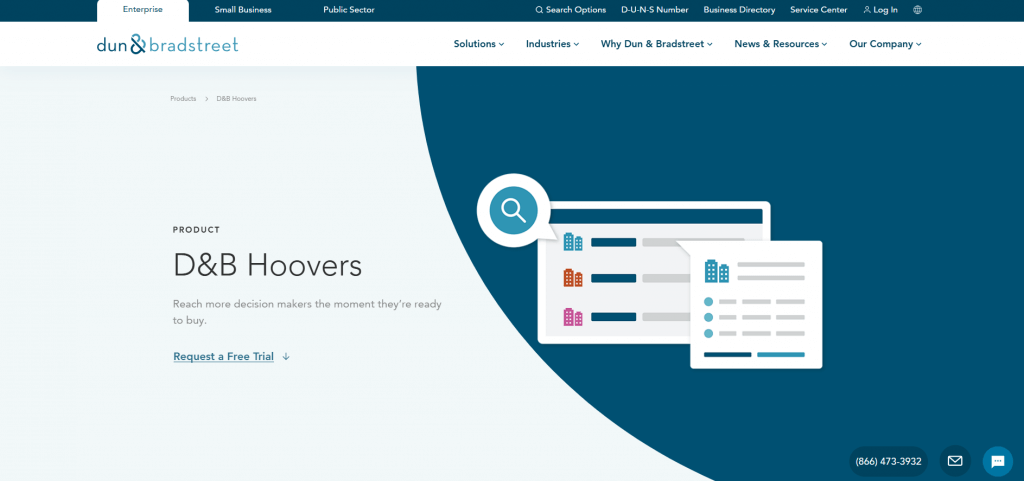
Key Features
- 170 million global company records
- Customizable lead lists with advanced firmographic filters
- CRM integration
Pricing
- Custom quote only; typically for mid-sized to larger teams
- Free trial available
Ratings
- G2: 4.1/5
- Capterra: 4.3/5
Pros
- Highly reputable firmographic and business data
- Excellent for enterprise-level business insights
- Global data coverage
Cons
- Higher price point, less transparent pricing
- May have fewer direct contact details compared to specialized tools
- Contracts may have restrictive renewal clauses
18. AeroLeads
AeroLeads is a cost-effective, email-focused prospecting tool for sales outreach.
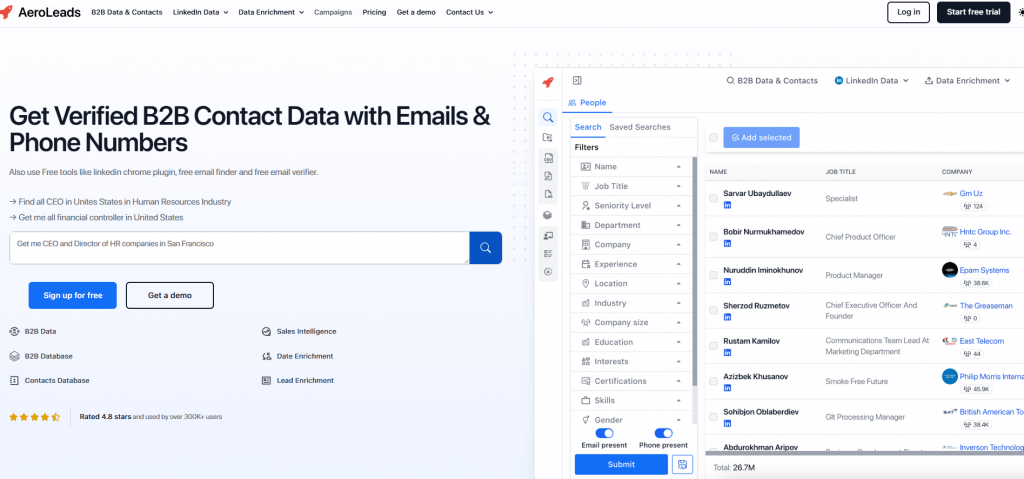
Key Features
- Large email database
- Chrome extension for LinkedIn/email capture
- CRM/email integration
Pricing
- Starts at $49 per month (Take-Off plan, 1,000 verified prospects/month)
- “Climb” and “Cruise” tiers add more credits and users
Ratings
- G2: 4/5
- Capterra: 4.6/5
Pros
- Affordable, straightforward
- Strong email verification
- Good CRM integration
Cons
- Limited phone data
- Basic features/UI
- Data sparse for niche industries
19. Cloudlead
Cloudlead provides customized, verified B2B leads using a mix of AI and human researchers—ideal for specialized lead-generation needs.
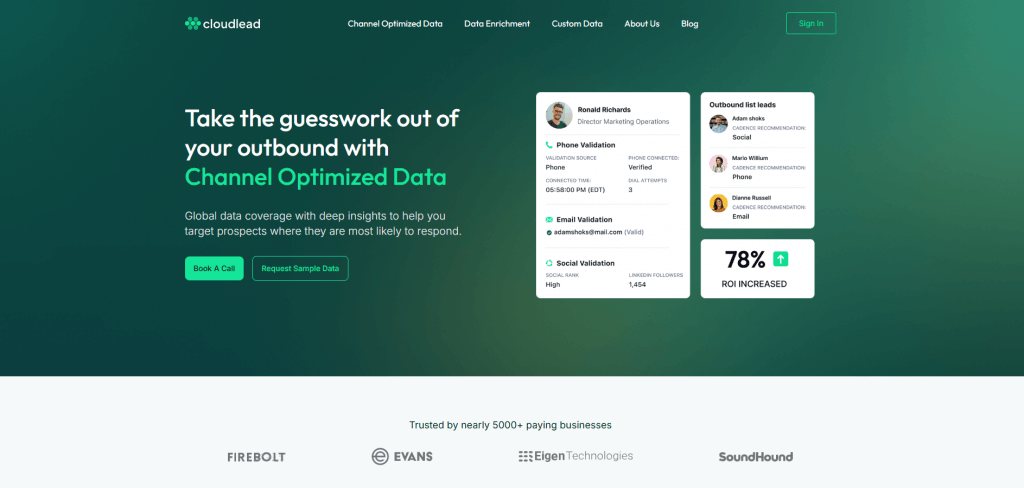
Key Features
- Custom lead generation (human-verified)
- CRM-ready data enrichment
- Outsourced lead research service
Pricing
- Custom quoted based on project scope
Ratings
- G2: 4.8/5
- Capterra: N/A
Pros
- Highly targeted and verified leads
- Hands-off approach (fully managed)
- Strong customer support
Cons
- Turnaround time required
- Cost higher than self-serve databases
20. Leadfeeder
Leadfeeder identifies anonymous website visitors, providing companies and contacts to drive warm B2B outreach.
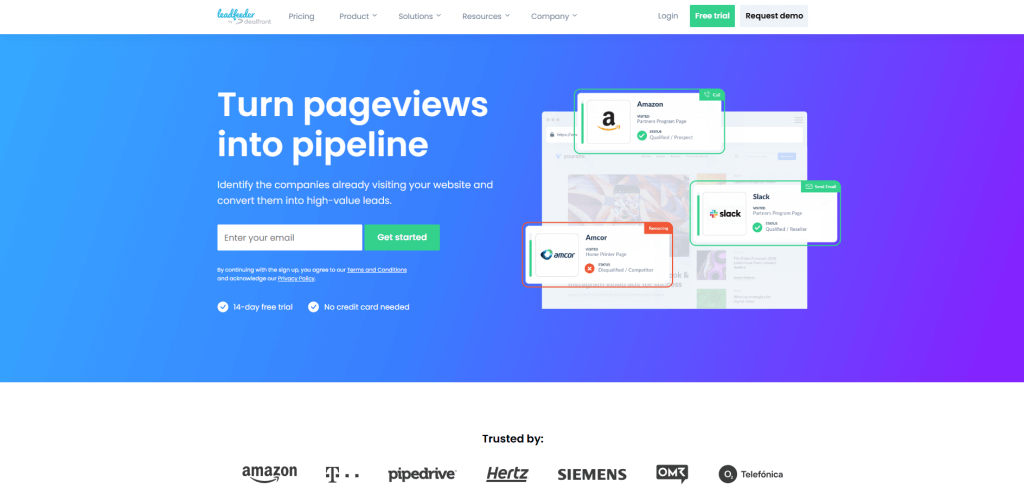
Key Features
- Website visitor tracking
- Lead scoring by engagement
- CRM integrations
Pricing
- Free (Lite, limited),
- Premium from €199/month
Ratings
- G2: 4.3/5
- Capterra: N/A
Pros
- Generates highly intent-driven leads
- Easy integration and usability
- Excellent for inbound marketing
Cons
- Requires existing web traffic
- Identifies companies better than individuals
21. DiscoverOrg
DiscoverOrg, now part of ZoomInfo, provided premium B2B contacts with detailed org charts, direct dials, and intent data, ideal for enterprise sales.
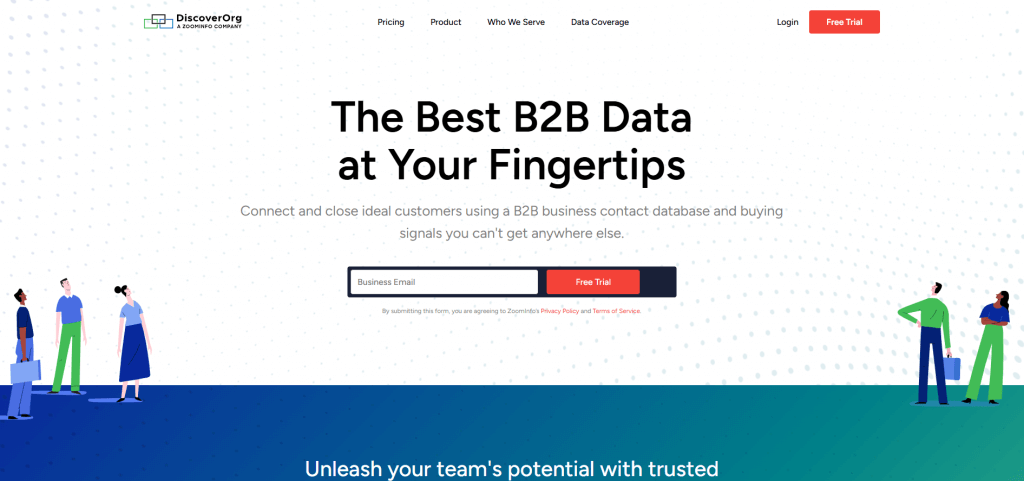
Key Features
- Detailed org charts
- Direct decision-maker contacts
- Trigger events and intent signals
Pricing
- N/A
Ratings
- G2: N/A
- Capterra: 4.2/5
Pros
- Deep company insights and verified contacts
- Excellent enterprise data quality
Cons
- High pricing; may be excessive for smaller teams
- Transition to ZoomInfo’s interface and structure required
22. Megaleads
Megaleads provides targeted business and consumer leads, specializing in niche markets like mortgage and local SMBs.
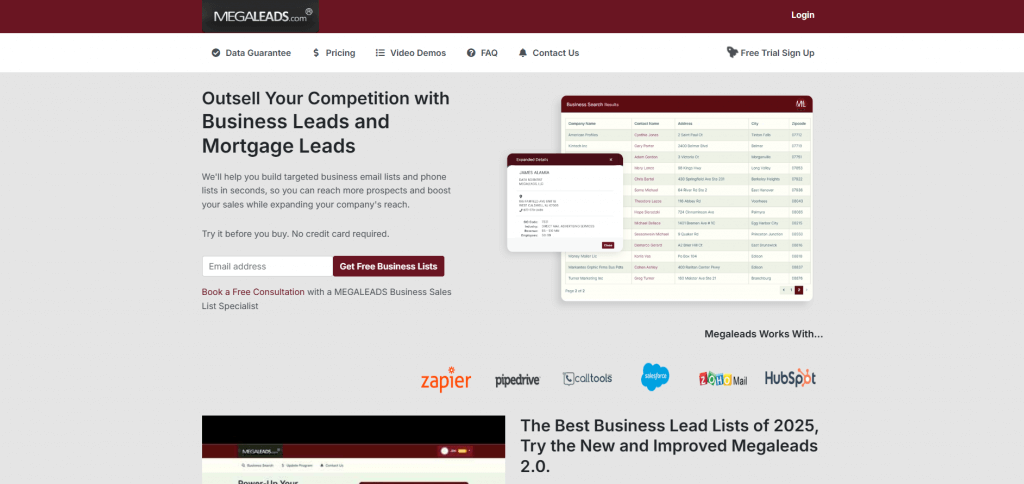
Key Features
- Niche U.S. lead lists
- Intent signals available for select segments
- CSV export functionality
Pricing
- Tiered plans (Silver, Gold, Platinum), starting under $100/month
Ratings
- G2: N/A
- Capterra: N/A
Pros
- Specialized niche datasets
- Generous free trial (unlimited searches)
- Strong SMB coverage
Cons
- Limited outside niche segments
- Basic interface, manual CSV imports
What are the Benefits of Buying Business Leads?
Why buy leads instead of generating them all manually? There are several compelling benefits to purchasing B2B leads from a reputable source:
- Rapidly expand your reach: Buying leads allows you to tap into a much bigger total addressable market (TAM) than you might reach through inbound marketing alone. Instead of waiting for prospects to find you, you can proactively get a list of thousands of potential customers fitting your ideal criteria.
- Save time on prospecting: High reply rates depend on fresh business contact leads with direct dials, not generic emails. Your reps won’t waste time hunting for contact data; they’ll get direct dials and verified emails up front. This means less time hunting down contacts and more time actually connecting with prospects.
- Boost pipeline and conversion rates: When done right, purchased leads can be very targeted and high-quality, which often results in better conversion rates. If you can buy a list of prospects already showing interest, your sales outreach will naturally yield more opportunities.
- Jumpstart new market entry: If you’re moving into a new market or territory, buying leads gives you immediate traction. For example, if you start targeting enterprise healthcare companies, you can simply purchase a vetted list of enterprise healthcare contacts to get started.
- Quickly fill pipeline gaps: If your sales funnel is running dry (say, after a slow quarter or loss of a big customer), buying leads is a fast way to fire up your pipeline and make up ground. It’s like turning on a faucet of prospects to keep your team busy.
- Supports account-based strategies: Many providers offer rich data and signals (technology used, hiring trends, etc.) that help you prioritize and personalize outreach. This makes your account-based marketing or sales efforts more effective, as you can focus on the accounts most likely to convert.
Key Factors to Consider When Buying Business Leads
Not all lead providers or lists are equal. It’s crucial to choose the right source and approach to ensure you get value and stay on the right side of compliance. Here are key factors and “due diligence” tips when buying B2B leads:
- Data Accuracy & Quality: This is absolutely paramount. Ask providers about their accuracy guarantees and how they verify data. Look for providers that do real-time email verification or have human data validation processes. High accuracy means less email bounces, less time wasted, and a better reputation for your email domain.
- Recency of Data: How fresh is the data? Business info can go stale fast (people change jobs, companies move, etc.). Ensure the provider updates data frequently or offers a research-on-demand service for updates. Real-time enrichment tools or “dynamic lists” that auto-update are certainly a plus.
- Relevance & Targeting: Define your ICP clearly (industry, size, titles, etc.) and choose a provider that lets you buy targeted leads enriched with intent data, so your reps reach prospects already in-market instead of cold leads. The more granular the filtering (e.g., by tech stack, by intent signals), the better you can tailor the list to likely buyers. Don’t be tempted to buy a generic massive list. Focus on quality and relevance to your offering.
- Compliance & Permissions: Only work with providers who follow privacy laws (GDPR, CCPA, CAN-SPAM) and obtain data ethically. Compliance isn’t just legal protection; it also tends to indicate higher data quality. GDPR applies to business to business leads as well as consumer data, so compliance can’t be an afterthought. Confirm that business emails are used (not personal consumer emails) and that phone numbers are scrubbed against DNC lists if you’ll be calling.
- Integration with Your Systems: Consider how you will use the leads. Does the provider have a CRM integration or API to easily import leads into your system? Smooth integration saves you time and ensures leads get followed up promptly (e.g., auto-importing leads into Salesforce and assigning to reps).
- Pricing Model: Align the pricing with your needs. If you need continuous leads, a subscription model might be best. If it’s a one-time campaign, maybe a pay-per-lead or one-off list purchase will be more cost-effective. Also, watch out for hidden costs, such as extra fees for certain data fields or limits on the number of exports. Make sure to calculate the cost per lead and weigh it against your expected conversion value.
- Scalability & Contract Terms: Think proactively about the future. Can the solution scale as you grow? Also, check contract terms. Some vendors have auto-renewals or require notice to cancel. Flexibility is important: if you are testing a provider, a short-term or monthly plan might be preferable to start with.
- Provider Reputation & Reviews: Do your homework on review sites like G2, Capterra, Trustpilot, etc. to see real customer feedback. Look for common pros and cons in reviews. If multiple reviews mention outdated data or poor support, that’s a major red flag. Also, note how the provider responds to negative reviews; it indicates their support ethos.
- Additional Features: Beyond just contacts, consider if features like intent data, technographic data, or organizational charts are beneficial for you. For example, if you can get info that a prospect is actively researching solutions (intent) or recently hired a new CTO, those insights can greatly improve your outreach timing and personalization. Choose a platform that offers the intelligence you need, not just names and emails.
- Trial or Sample Data: If possible, start with a free trial or a data sample. Many providers will offer a small sample of leads in your target to prove their value. Use that to verify the data quality and see if it fits your ICP.
Common Red Flags to Watch Out for When Buying Buying Leads
While there are many legitimate data providers, the industry also has some bad actors. Be vigilant about the following red flags or warning signs to avoid wasting money or risking your company’s reputation:
- “Too Good to Be True” Volume for Cheap: If a company offers millions of leads for a very low price, be skeptical. Rock-bottom prices often mean the data is either scraped without quality control or very outdated. Quality data has some costs associated with it to compile and verify.
- Purchased Consumer Emails in a B2B List: If you see a lot of generic providers like Gmail, Yahoo in a “business” leads list, that’s a red flag. Using personal emails for B2B cold outreach can violate privacy laws and is often ineffective.
- High Bounce Rates or Spam Traps: One big danger with low-quality lists is they may include spam trap addresses or people who never gave consent. Using these email addresses can hurt your sender reputation. If you test a small batch and see a very high bounce rate or get blacklisted, discontinue use immediately. Before you purchase business leads, confirm the provider scrubs data against global do‑not‑call lists.
- Lack of Transparency on Data Sources: If a vendor is vague about how they collect and update data, be cautious. You want to hear things like “combination of public sources, partnerships, user-contributed data, and a verification process,” not something dodgy.
Which is the Best Place to Buy Business Leads for SMBs in the US?
For small and medium-sized businesses (SMBs) in the US, the ideal lead source often offers a combination of affordability, ease of use, and solid U.S. coverage. For many SMBs, Salesgenie remains the best place to buy leads thanks to both unlimited searches and transparent pricing.
Salesgenie is practically tailor-made for SMBs: it has a huge database of U.S. businesses, allows for granular local targeting, and is straightforward to use even if you don’t have a dedicated data analyst on your team. It’s been around for decades serving small business owners and sales teams and even won recognition for its focus on small business markets.
With Salesgenie, an SMB can get unlimited access to leads without breaking the bank. And the platform’s built-in marketing tools are handy if you have a tiny team and want everything in one place.
Another great option for SMBs is Lead411 or Apollo.io. Lead411’s Basic plan at $99/month gives a small business a lot of bang: human-verified leads, integrated intent signals, and unlimited exports, so you’re not nickel-and-dimed on usage. Apollo.io’s lower tier plans also pack a lot of value with their large database and included outreach functionality, which an SMB can leverage without buying separate software.
How to Maximize ROI from Purchased Business Leads
Buying leads is an investment. To maximize your return on that investment (ROI), you should follow best practices in how you handle and use those leads. Here are a few strategies to get the most value:
- Clean and Verify the Data: Even if the provider claims high accuracy, do a quick sanity check. Run the emails through an email verifier. Many providers offer one built-in or you can use a service like NeverBounce to catch any strays. Remove duplicates or contacts that don’t meet your criteria on closer inspection. This upfront scrubbing ensures your campaigns won’t be dragging along dead weight.
- Enrich for Full Profiles: Often purchased leads come with basic info (name, title, company, email, phone). It can be worth enriching them with additional data. Import them into your CRM and use a data enrichment tool to add industry, company size, LinkedIn URL, etc., if not already present. More complete profiles help your sales team tailor their outreach.
- Segment Your Lead Lists: Don’t treat all leads the same. Segment the leads into logical groups. For example, by industry, by persona, or by intent level if you have that data. This allows you to craft more personalized messaging. Segmented campaigns tend to resonate better than a one-size-fits-all blast.
- Quick Follow-Up and Cadence: The value of a lead decays over time. Once you purchase or generate a lead list, have a plan to reach out promptly, ideally within a couple of days. Implement a multi-touch cadence (email, call, LinkedIn) to engage them. If you let leads sit idle, you’re not only wasting money but possibly missing their window of interest.
- Use Multiple Channels: Don’t rely on a single channel. A combination of email + phone + social touchpoints can dramatically improve response rates. For instance, an email followed by a call referencing that email can warm up cold leads effectively. Make sure your team is equipped to utilize the phone numbers, not just send emails en masse.
- Personalize Outreach with Context: Leverage the data you have to add any relevant contextual information in your messaging. If the lead source gives you company insights or intent signals, mention something relevant in your email. For example, you might say, “I noticed your company recently expanded to APAC. Congrats! Many of our clients in your space struggle with…” This shows you’ve done your homework and aren’t just spamming thousands of people. Personalization can significantly lift reply rates and, ultimately, ROI.
Your Game Plan for Buying Business Leads
Buying business leads can be a game-changer for accelerating B2B sales if done thoughtfully. As we’ve covered, the landscape of lead providers in 2025 is rich with options, from massive databases like Salesgenie and Data Axle USA, to specialized tools like Kaspr and Seamless.ai, to intent-driven platforms like Leadfeeder. The key is to choose a reputable provider that aligns with your target market and offers the data quality and features you need.
Always keep in mind the following as you venture into purchasing leads:
- Define your needs and budget: Be clear on what kind of leads you need (industry, titles, region, etc.) and how much you’re willing to spend. This will narrow down the provider list to those that are the best fit.
- Do your homework: Research providers, read reviews, and whenever possible, test with a trial or sample. A provider that works great for one company might not be ideal for another. As always, it depends on the specific use-case. Make an informed decision using data points and comparisons.
- Demand compliance and quality: Only work with providers who take compliance seriously and who stand by their data, either through accuracy guarantees or replacement policies. High-quality, compliant data might cost more upfront, but it’s far more cost-effective in the long run than dealing with bounced emails, spam issues, or irrelevant contacts from a cheap list.
- Integrate and act quickly: Once you have your lead source, integrate it into your workflow and get your sales team to reach out quickly. The value of leads comes from using them effectively. Monitor results and optimize your approach as you learn what works best.
Remember, purchased leads are just the beginning of the sales process. It’s what you do with them that ultimately determines success. In a best-case scenario, a great lead provider partnered with a sharp sales strategy can dramatically boost your pipeline and revenue growth.
In 2025’s competitive environment, leveraging quality lead data can give you an edge, opening doors to prospects you might not have found otherwise. Just be sure to treat those leads as real people and companies, not just entries in a spreadsheet. Approach them with insights and care. Do that, and your investment in buying business leads will pay dividends in both new clients and business growth.
FAQs
Yes, buying B2B contact lists is legal as long as the data is obtained and used in compliance with privacy laws. Reputable providers operate within regulations like GDPR in Europe and CCPA in California. Always choose providers who follow strict compliance standards and be sure your outreach practices also adhere to the relevant laws.
Start by using trusted lead providers – look for those with strong reviews and accuracy guarantees. Request a small sample of leads and evaluate them: check if the emails are valid, if the phone numbers connect, and if the titles/companies match your target profile. You can also run the sample through an email campaign and see the bounce rate and perhaps a pilot call campaign to gauge connect rates.
The cost varies widely depending on the source and the quality. Some providers charge per lead, which can be anywhere from a few cents for bulk basic data to $5–$10 for qualified or exclusive leads. Others have subscription models. For example, $100–$1000+ per month for a certain number of credits or unlimited access. As a benchmark, high-end leads can be more expensive, whereas broad database access can bring the per-lead cost down significantly.
Absolutely. Most lead providers allow you to filter by specific criteria to ensure the leads match your target job titles, industries, company size, geography, etc. The more specific you can be with your criteria, the better the leads will fit your needs. Just ensure the provider you choose has strength in that specific segment. Some specialize by industry or region.
No, purchasing leads does not guarantee that you will make a sale. It just provides you a starting point for outreach. Think of leads as opportunities; your sales team still needs to engage, nurture, and close those prospects. The goal is that by having more qualified contacts to work with, you increase the chances of finding those who are interested and ready to buy, thereby boosting overall sales. It speeds up the process, but it doesn’t eliminate the need for effective sales tactics.
An “email list” usually refers to a compilation of email addresses, often with minimal additional info. It could be consumer or business emails, and sometimes these are just harvested lists sold in bulk, not always high quality or targeted. B2B leads, on the other hand, typically refer to complete contact records of business people, including name, company, title, work email, phone number, etc.
You can buy many, many types of leads, depending on what you need. Some common categories include: Email leads (verified email contacts for outreach campaigns), Marketing leads (contacts meant for your marketing funnels, often broader at the top-of-funnel), Sales-qualified leads (SQLs) which are more targeted to your sales criteria, SMB leads (small business contacts) vs. Enterprise leads (large company contacts), Direct dials (leads that come with a direct phone number for the person), Mobile number leads (increasingly important for reaching remote/hybrid workers), Intent-based leads (contacts who show buying signals), and even LinkedIn leads.





